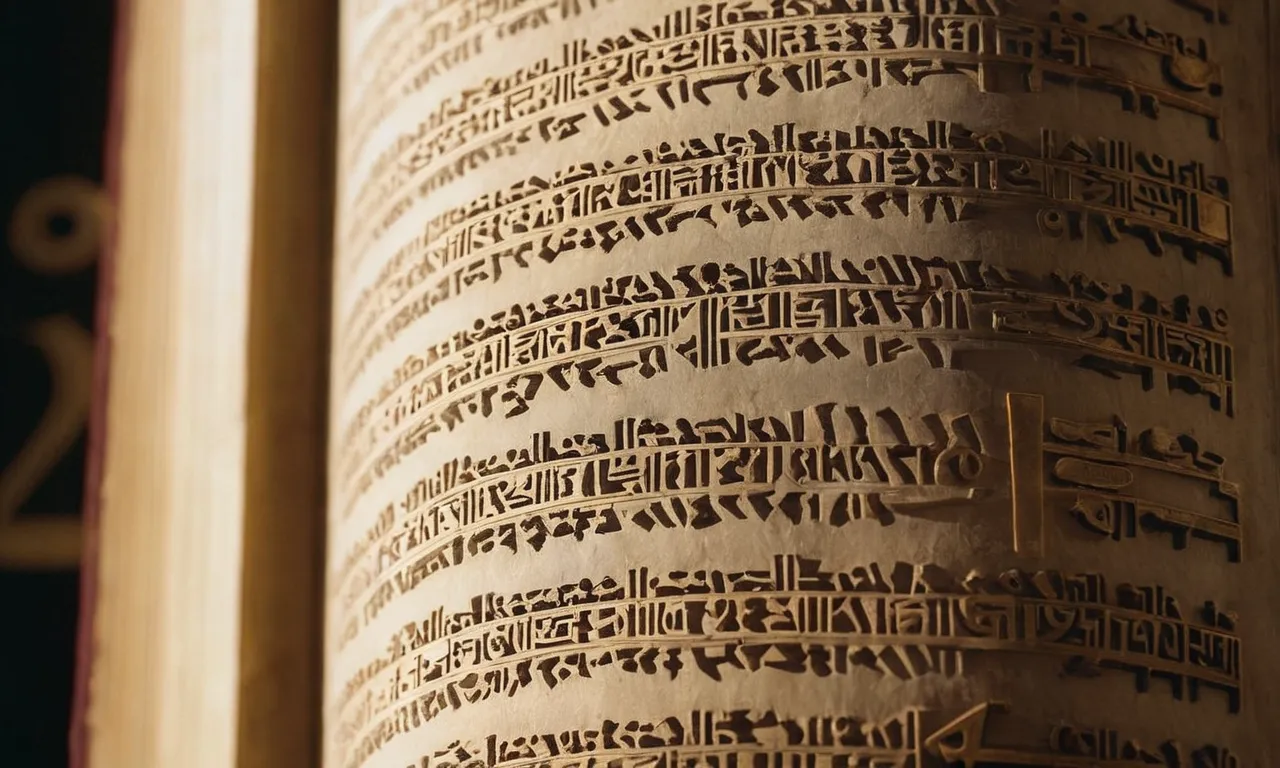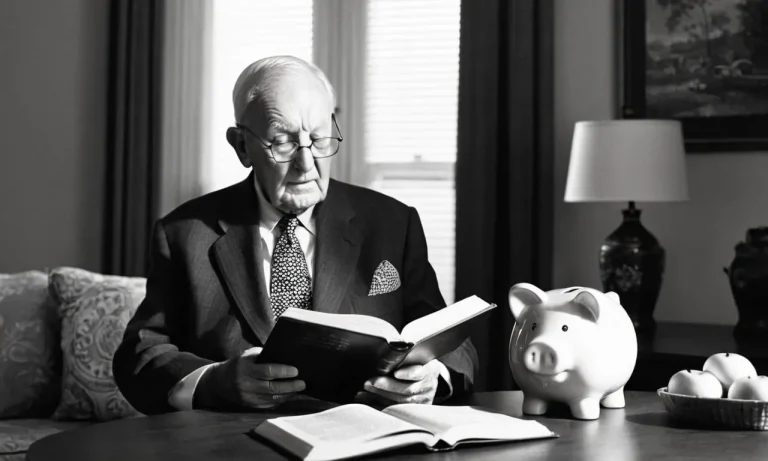The Significance Of Rebekah In The Bible
Rebekah is a crucial figure in the Bible, playing an instrumental role in the story of Isaac and the continuation of God’s covenant. As Isaac’s wife and the mother of Jacob and Esau, the founders of two great Biblical nations, Rebekah’s influence reverberates throughout scripture.
If you’re short on time, here’s the key reason Rebekah is so important: she was chosen by God to be the matriarch of His chosen nation Israel. Through Rebekah, God ensured the fulfillment of His covenant with Abraham.
Rebekah as Isaac’s Wife
Arranged marriage orchestrated by God
Isaac was the beloved son of Abraham, through whom God had promised to build a great nation. However, Isaac was still unmarried. Knowing the importance of Isaac’s future offspring, Abraham wanted to find a suitable wife for his son.
Rather than let Isaac choose his own wife, Abraham sent his most trusted servant back to his homeland to find a wife for Isaac from his own people. God providentially led the servant to Rebekah, the beautiful daughter of Abraham’s relative Bethuel.
When the servant met Rebekah at a well and asked for a drink of water, she kindly offered to water his camels as well – a sign of her generous spirit. The servant immediately recognized Rebekah as the wife God had chosen for Isaac.
An arranged marriage was orchestrated by God to fulfill His greater purpose.
Rebekah passes Abraham’s servant’s test
When Abraham’s servant met Rebekah at the well, he asked her for a drink of water. Rebekah’s quick response and willingness to water his camels as well demonstrated her hospitable and kind spirit. The servant recognized these qualities as signs that Rebekah was the wife God had appointed for Isaac.
He rewarded Rebekah’s kindness by giving her valuable gifts of gold and silver. When Rebekah arrived home and told her family about the encounter, her brother Laban was eager to meet this man and bring him into their home. The servant recounted the entire story of his quest to find a bride for Isaac.
He made it clear that his encounter with Rebekah was providential and orchestrated by God. Convinced of God’s leading, Laban and Bethuel agreed that Rebekah could return with the servant to become Isaac’s wife. Rebekah passed the test set before her and was chosen to fulfill God’s greater plan.
Rebekah leaves family behind showing faith in God’s plan
After agreeing to marry Isaac, Rebekah selflessly left behind her family and homeland to travel to a foreign place and marry a man she had never met. This took tremendous faith and courage. As the caravan approached, Isaac went into the fields to meditate and encountered Rebekah for the first time.
Isaac married Rebekah, loved her, and was comforted by her after the recent death of his mother Sarah. Rebekah never saw her family again, but God rewarded her faith by making her the mother of Jacob and Esau, through whom great nations would come.
Rebekah left everything familiar behind and trusted in God’s greater plan for her life. Her story inspires us to step out in faith when God calls us to fulfill His purposes.
Mother of Jacob and Esau
Rebekah struggles with barrenness for 20 years
Rebekah was the wife of Isaac and mother of Jacob and Esau. After marrying Isaac, Rebekah struggled with infertility and was unable to conceive for nearly 20 years (Genesis 25:20-26). This was a hardship and source of shame in ancient Near Eastern culture, where producing offspring was highly valued.
Though Isaac prayed for her, God did not immediately grant Rebekah the ability to have children. Her persistence through this trial demonstrates her faithfulness and trust in God’s timing and purpose.
Rebekah inquires of God about the twins struggling within her
After enduring barrenness for so long, Rebekah finally conceived twins. However, the pregnancy was difficult, as the babies “struggled together within her” (Genesis 25:22). Unsure of the meaning, Rebekah inquired of God.
He revealed that two nations were in her womb and the older would serve the younger, foreshadowing the future roles of her sons Jacob and Esau. Though this divine oracle gave her insight, it likely also troubled Rebekah, as the firstborn son traditionally received the birthright.
Yet God often works in unexpected ways, choosing younger sons like Isaac over older sons like Ishmael. Rebekah’s inquiry of the Lord demonstrates her wisdom and spiritual sensitivity amidst challenging circumstances.
Rebekah favors Jacob, scheming to secure blessing for him
As foretold, Rebekah favored her younger son Jacob over Esau. When Isaac was old and ready to give his blessing, Rebekah helped Jacob deceive his father into blessing him instead of Esau. Some see Rebekah’s actions as manipulative.
However, her scheming aimed to fulfill God’s word that “the older shall serve the younger” (Genesis 25:23). Perhaps Rebekah was wrong to employ trickery, but her underlying motivation was to see God’s purposes realized in her family.
This shows her desire to align with God’s will, though she did so through questionable means. Overall, Rebekah was a pivotal matriarch who, despite her flaws, played a key role in the covenant line leading to Jesus.
Rebekah Secures Blessing for Jacob
Rebekah overhears Isaac plan to bless Esau first
As Isaac grew old, he wanted to bestow the blessing and birthright to his eldest son Esau before passing away. Overhearing this, Rebekah was troubled as she favored her younger son Jacob. According to Genesis 27, Rebekah helped orchestrate a plot for Jacob to receive the blessings instead.
Rebekah disguises Jacob as Esau to trick Isaac
Knowing that Isaac’s eyes were too weak to tell his sons apart, Rebekah dressed Jacob in Esau’s garments and covered his smooth skin with goatskins to mimic Esau’s hairiness. She prepared a tasty meal that Isaac favored so that Jacob could bring it to his father under the guise of being Esau.
This cunning deception worked, as Isaac blessed Jacob thinking he was Esau.
Deception secures blessing and birthright for Jacob
By disguising Jacob, Rebekah secured the paternal blessing and birthright for her younger son through trickery. While morally questionable, her ingenious plot highlights her tenacity and resourcefulness to override standard custom.
This event also underscores the significance of blessings in biblical times, which if given, could not be rescinded. Ultimately, Rebekah’s deception changed the course of history, enabling Jacob to become a patriarch of the 12 tribes of Israel.
Mother of Two Great Nations
Jacob father of the nation of Israel
Rebekah was the mother of Jacob, who later became known as Israel. Jacob was the younger twin brother of Esau. Though Esau was technically the firstborn, Rebekah favored Jacob. Through some clever scheming, Rebekah helped Jacob trick Isaac into giving him the birthright blessing that was meant for Esau (Genesis 27).
This set Jacob up to carry on the covenant promises God had made to Abraham and Isaac.
Later in life, Jacob had 12 sons who became the 12 tribes of Israel. His name was changed to Israel after he wrestled with God (Genesis 32:28). Thus, the nation of Israel traces its covenant heritage through Jacob back to Abraham.
Some key facts about Jacob:
- He was the son of Isaac and Rebekah and twin brother to Esau.
- He purchased Esau’s birthright and tricked Isaac into giving him the firstborn blessing.
- He had 12 sons who became the 12 tribes of Israel.
- His name was changed to Israel, which became the nation’s name.
- God confirmed the Abrahamic covenant with him.
As the mother of Jacob, Rebekah played a pivotal role in the covenant line that brought about the nation of Israel. Truly, she was a mother of this great nation through her son Jacob.
Esau father of the nation of Edom
Rebekah’s other son Esau also fathered a nation – the nation of Edom. After Jacob tricked him out of his birthright blessing, Esau moved to the region of Seir and took wives from among the Canaanites (Genesis 36). His descendants became the Edomites who settled in Edom, south of the Dead Sea.
Here are some key details about Esau and his descendants:
- Esau was the firstborn twin of Rebekah, older than Jacob.
- He sold his birthright to Jacob for a bowl of stew (Genesis 25:29-34).
- Jacob later tricked their father Isaac into giving him Esau’s blessing.
- Esau became angry and moved to the region of Seir (Genesis 32:6, 36:8).
- He took Canaanite wives and his descendants became the Edomites.
- The Edomites established the kingdom of Edom south of Israel.
While the Edomites were not part of the covenant people of Israel, they still traced their lineage back to Rebekah through her son Esau. As the mother of Esau, Rebekah played an important role in the history of Edom as well.
Truly she was the matriarch of two great nations that came about through her sons Jacob and Esau.
Rebekah’s Death and Burial
Rebekah nurses Jacob’s father Isaac in his old age
As Isaac advanced in years, he became blind and feeble. According to tradition, Rebekah lovingly cared for her husband in his old age. She remained devoted to Isaac, helping feed and nurse him as his health deteriorated (Genesis 27:1).
Though Isaac and Rebekah favored different sons, Rebekah continued fulfilling her wifely duty of providing comfort and support. Her tireless service highlights the selfless aspect of love in marriage.
Rebekah dies and is buried in Machpelah cave tomb
There is no further mention of Rebekah after Isaac’s blessing of Jacob. She likely died before her husband, as she is not recorded as being buried alongside Isaac. According to Jewish tradition, Rebekah died at the age of 133 when Jacob was living in Haran (Genesis 29-31).
She was buried in the Cave of Machpelah in Hebron, where Abraham, Sarah, Isaac, Leah and Jacob were also laid to rest (Genesis 49:31).
Though she passed many years before her sons reconciled, Rebekah remained instrumental in shaping the destiny of God’s chosen people. As the beloved wife of Isaac and devoted mother of Jacob, her legacy endures as an integral figure in Israel’s formation. Centuries later, Rebekah is honored in the New Testament among the heroes of the faith (Hebrews 11:11).
Conclusion
As the wife of Isaac and mother of Jacob and Esau, Rebekah plays a pivotal role in God’s covenant plan. Though imperfect, God uses Rebekah’s scheming to ensure the blessing passes to Jacob. The resulting nations trace their lineage directly back to Rebekah, proving her integral importance in scripture.








